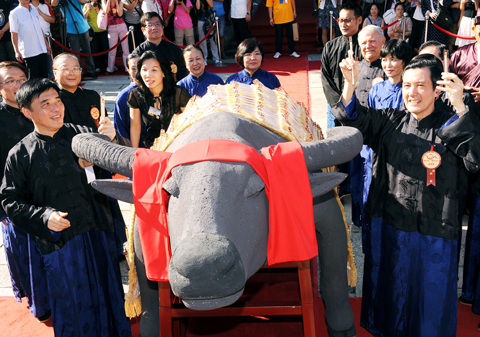Hundreds of local and foreign visitors crowded the Taipei Confucius Temple early yesterday morning to watch the traditional bayi (八佾) dance and eat wisdom cakes in celebration of Confucius’ (孔子) 2,560th birthday.
The dance, a ritual performed to pay respect to emperors, was performed by 64 students and was only the second such performance in Taiwan in 12 years.
The temple sparked controversy when it performed the ritual two years ago to welcome President Ma Ying-jeou’s (馬英九) attendance at the ceremony, attracting criticism from opposition parties that the temple was “worshiping Emperor Ma” with the dance.

PHOTO: CHANG CHIA-MING, TAIPEI TIMES
Ma attended the ceremony again yesterday to pay his respects to the philosopher by burning incense and watching the bayi dance. The temple also opened the Lingxing Gate, the main entrance of the temple that is usually closed during the ceremony, and arranged for the president to enter the temple via the route traditionally taken by emperors.
Shih Su-li (施淑梨), the temple’s secretary, declined to confirm whether the temple performed the dance and opened the main entrance specifically for the president and insisted that all rituals and arrangements followed ancient traditions.
The temple usually performs the liuyi (六佾), a ritual performed to pay respects to feudal barons, to celebrate Confucius’ birthday.
Addressing the ceremony after the two-hour ritual, Ma cited the Analects to emphasize the importance of politicians taking a righteous path and said he chose to attend the ceremony to promote Confucianism.
“I have attended this ceremony twice because I think Confucianism and the rituals should be part of our lives ... Confucius taught us that a politician must take the righteous path, and if you take that path, your subordinates would not dare to take an evil path,” he said.
Ma is the first president to participate in the ceremony at the temple. Former president Chiang Kai-shek (蔣介石) visited the temple one day before the ceremony in 1968, Shih said.
The ceremony was presided over by Taipei Mayor Hau Lung-bin (郝龍斌).
The temple is one of the few Confucius temples that still performs ancient rites that strictly follow the ancient rules with 37 steps in the ceremony sequence.
After the performance of the ritual, some visitors rushed to the center plaza of the temple to “pull” writing brushes from an artificial cow’s back as part of the “pulling of wisdom hair” ritual, creating a chaotic scene when some ran into each other and fell down.
Shih said the temple had 2,000 brushes at the ceremony, and it did not expect to have so many people participate in the activity.

‘DENIAL DEFENSE’: The US would increase its military presence with uncrewed ships, and submarines, while boosting defense in the Indo-Pacific, a Pete Hegseth memo said The US is reorienting its military strategy to focus primarily on deterring a potential Chinese invasion of Taiwan, a memo signed by US Secretary of Defense Pete Hegseth showed. The memo also called on Taiwan to increase its defense spending. The document, known as the “Interim National Defense Strategic Guidance,” was distributed this month and detailed the national defense plans of US President Donald Trump’s administration, an article in the Washington Post said on Saturday. It outlines how the US can prepare for a potential war with China and defend itself from threats in the “near abroad,” including Greenland and the Panama

A wild live dugong was found in Taiwan for the first time in 88 years, after it was accidentally caught by a fisher’s net on Tuesday in Yilan County’s Fenniaolin (粉鳥林). This is the first sighting of the species in Taiwan since 1937, having already been considered “extinct” in the country and considered as “vulnerable” by the International Union for Conservation of Nature. A fisher surnamed Chen (陳) went to Fenniaolin to collect the fish in his netting, but instead caught a 3m long, 500kg dugong. The fisher released the animal back into the wild, not realizing it was an endangered species at

The High Prosecutors’ Office yesterday withdrew an appeal against the acquittal of a former bank manager 22 years after his death, marking Taiwan’s first instance of prosecutors rendering posthumous justice to a wrongfully convicted defendant. Chu Ching-en (諸慶恩) — formerly a manager at the Taipei branch of BNP Paribas — was in 1999 accused by Weng Mao-chung (翁茂鍾), then-president of Chia Her Industrial Co, of forging a request for a fixed deposit of US$10 million by I-Hwa Industrial Co, a subsidiary of Chia Her, which was used as collateral. Chu was ruled not guilty in the first trial, but was found guilty

The Chinese Nationalist Party (KMT) is maintaining close ties with Beijing, the Democratic Progressive Party (DPP) said yesterday, hours after a new round of Chinese military drills in the Taiwan Strait began. Political parties in a democracy have a responsibility to be loyal to the nation and defend its sovereignty, DPP spokesman Justin Wu (吳崢) told a news conference in Taipei. His comments came hours after Beijing announced via Chinese state media that the Chinese People’s Liberation Army’s Eastern Theater Command was holding large-scale drills simulating a multi-pronged attack on Taiwan. Contrary to the KMT’s claims that it is staunchly anti-communist, KMT Deputy